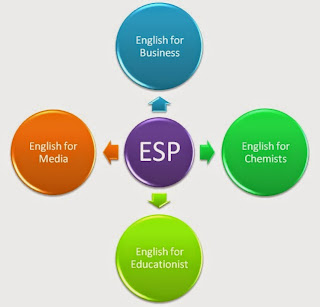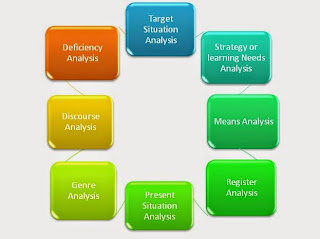To evaluate my assignment click here.
Submitted to - S. B. GARDY DEPARTMENT OF ENGLISH
M.K.BHAVNAGAR UNIVERSITY.
Name:- Vala Jyotsna Tanshukhbhai
Semester:
- 3
Roll
no: - 33
Enrollment
No: - PG15101042
Year:
- 2016-17
Paper
No: -12
Paper
Name: - ELT
Topic:
-“
English For Specific Purposes”by Tony-Dudley-Evans
“
English
For Specific Purposes”
Introduction:-

English for specific purposes (ESP) has for about 30 years
been a separate branch of
English Language Teaching. It
has developed its own approaches,
materials
and
methodology and is generally seen as a very active,even
'feisty'
movement that
has had considerable over the
more general activities of TESOL and
applied linguistics.
English
has became the internationally accepted
language of almost all the
fields of knowledge. Depending
on their specific needs and
requirements,s
new learners
who knew specifically why need English are created. In
some cases people with inadequate proficiency in English
need to be
taught to handle specific jobs. To
fulfill the
needs of these new learners new specific courses were
designed introduced. ESP is one of these specific courses.
From
early 1960's, ESP has emerged as one of the major
areas of EFL
teaching today. Various universities across
the globe are offering a
number of ESP courses nowadays.
EXAMPLES
:- English for Chemists, English for
Educationists, English for
Advertisements, English for
Media, etc.

Aspect of ESP – 1). Teaching
2).
Materials production
3).
Text- analysis
MEANING OF ESP
Dictionary
meaning of ESP :-
“ The
supposed ability to perceive to events and
information by means
other than the physical sense”.
ROBINSON
define ESP as.......
“ Goal
Directed”
HUTCHINSON
and WATERS (1975) says......
“
ESP is an approach rather than
a product”
Mackay
and Mountford 1975 define ESP as the
teaching of English for a
“ Clearly utilitarian
purpose”
“ESP is an approach to
teaching”.
“ESP
is an attitude of mind”.
Definition
of ESP

ESP is a term that refers to teaching or studying
English for a
particular career or for business in
general. ESP not to be confused
with specialized
English,is a spher of teaching English language
including Business English, Technical English,
Scientific English,
English for Art purposes, etc.
The
role of English in a language course of
programm of instruction in
which the content aims
of the course are fixed by the specific needs
of a
particular group of learners.
Characteristic
of English for Specific Purposes
(ESP)
ESP
is defined in the term of its absolute and
variable characteristic by
Tony Dudley Evens.
Absolute
Characteristics
- Meets specific needs of learners.
- Make use of underlying methodology and activities of the discipline it serves.
- Is centered on the language appropriate to these activities in terms of grammar, lexis, study skill, discourse and genre.
Variable
Characteristics
- May be related to or designed for specific disciplines.
- May use in particular situation, different methodologies from general English.
- Is likely to be designed for intermediate and advanced students.
- Most of the ESP courses assume some basic knowledge of the systems.
Classification
As
with most branches of TESOL and applied linguistics,
ESP if often
divided up into various categories with
mysterious acronyms.
Tony-Dudley-Evans
use two categories in ESP :-
1).
English For Academic purposes (EAP).
2).
English For Occupational purposes (EOP).
- EGAP – English for general academic purposes
- ESAP – English for specific academic purposes
- EGBP – English for general business purposes
- ESBP – English for specific business purposes
- CBI – Content – based instruction
- EVP – English for vocational purposes.
RESEARCH
Beyond
Needs Analysis :-
1).
Target situation analysis
2).
Learning situation analysis
3).
Present situation analysis
4).
Means analysis.


Chambers's 1980 This is generally called target
situation analysis.
ESP's
Stap :- 1. Initial Analysis
2.
Detailed Analysis
-
Learners
-
Level in English
-
Weakness in language
-
Skill needs
-
Learner's perception of
their needs.
The
Three Features Common To ESP
1.
Authentic materials
2.
Purpose – related orientation
3.
Self – direction.
Principles
of English for specific purposes
(ESP)
- Authenticity
- Research Base
- Learning Needs
- Learning/Mathodology.
Some
Of the Qualities of ESP as one of the ELT
branches
- ESP has specific needs
- ESP hascontent related materials
- ESP is centered on particular language function, kill...
- ESP is learner – centered
ESP is perceived as relevant
by the learners.
CONCLUSION
English
for specific purposes as an approach that is
based on the learner's
needs, and his expectations
behind learning language. To make it
clear, we will
just mention the guiding principle of ESP, which is “
tell me what you need English for,and i will tell you
the English
that you need”.
References
Dudley-Evens,
Tony(1998). Developments in English for Specific purposes: A multi-
disciplinary approach. Cambridge Universiry Press. (Forthcoming).
No comments:
Post a Comment